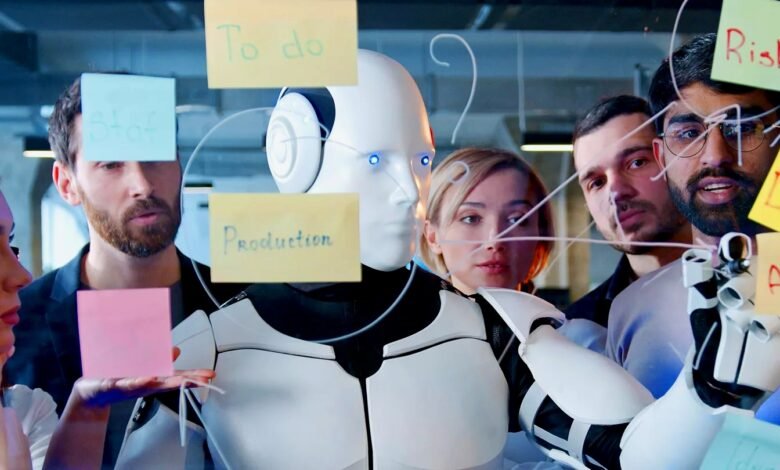The Future of Work: Top Skills Employers Are Looking for in 2025
Discover the essential skills shaping the Future of Work in 2025. Learn what employers seek in a rapidly evolving digital economy and how to future-proof your career.

The Future of Work is no longer a distant concept—it’s here, evolving rapidly with technological advancements, changing demographics, and shifting work models. From remote work to artificial intelligence (AI) and automation, the global workforce is undergoing a transformative phase. As we step into 2025, the job market is prioritizing a new set of competencies that go beyond traditional degrees and experience.
To thrive in this ever-changing landscape, both job seekers and employers must embrace adaptability, continuous learning, and digital proficiency. This article explores the top skills employers are actively seeking in 2025 and how you can align with these expectations to secure your place in the workforce of the future.
Why the Future of Work is Changing
Several factors are driving the transformation of the global job market:
- Technological innovation: Automation, AI, machine learning, and robotics are reshaping tasks once performed by humans.
- Remote and hybrid work models: The pandemic normalized work-from-home structures, prompting companies to seek digitally competent, self-driven employees.
- Gig and freelance economy: Independent work is growing, with platforms like Upwork and Fiverr enabling flexible employment.
- Generational shifts: Gen Z entering the workforce has brought new expectations around work-life balance, inclusion, and social impact.
As a result, the Future of Work demands a shift in focus—from academic qualifications to skill-based hiring.
Top 10 Skills Employers Are Looking for in 2025
1. Digital Literacy and Tech Proficiency
As the workplace becomes more digitized, employers seek candidates who are comfortable with digital tools, cloud platforms, and data analytics software. Whether you’re in marketing, healthcare, or finance, digital skills are now essential.
Examples of in-demand tools:
- Microsoft Power BI
- Google Workspace
- Salesforce
- Trello and Asana
- Zoom and Microsoft Teams
2. Data Analysis and Interpretation
Data is now the backbone of decision-making. Companies want employees who can collect, interpret, and act on data insights to improve performance and strategy.
Key data-focused roles:
- Data Analyst
- Business Intelligence Specialist
- Marketing Analyst
3. Emotional Intelligence (EQ)
In an age of AI and automation, emotional intelligence is what sets humans apart. The ability to empathize, manage interpersonal relationships, and navigate workplace dynamics is critical.
Key components of EQ:
- Self-awareness
- Emotional regulation
- Empathy
- Social skills
4. Critical Thinking and Problem Solving
Employers in 2025 are increasingly prioritizing critical thinkers who can evaluate complex problems and deliver innovative solutions. With rapid technological change, challenges arise quickly and need agile responses.
Industries demanding these skills:
- Technology
- Healthcare
- Legal services
- Financial services
5. Adaptability and Flexibility
The Future of Work is unpredictable. Employees must be willing to pivot quickly, learn new technologies, and take on varied roles.
Why it matters:
- Constant technological updates
- Cross-functional team setups
- Global and cultural shifts
6. AI and Machine Learning Literacy
Understanding how AI tools work—even at a basic level—can help employees stay relevant. Employers want candidates who are not intimidated by automation but can work alongside it.
Key areas to focus on:
- Chatbots and AI tools (e.g., ChatGPT)
- Predictive analytics
- Natural Language Processing (NLP)
7. Leadership and People Management
Even in a remote setting, leadership remains crucial. Companies are looking for individuals who can inspire, coordinate, and manage teams across geographies.
Leadership traits for 2025:
- Virtual team management
- Collaborative leadership
- Inclusive decision-making
8. Cybersecurity Awareness
With remote work and cloud computing on the rise, cybersecurity has become a top concern. Employees with even basic security awareness are a valuable asset.
What employers look for:
- Understanding of phishing and malware
- Knowledge of secure file sharing
- Password and data management best practices
9. Creativity and Innovation
As routine tasks become automated, creativity becomes a top differentiator. Whether in product design, marketing, or customer experience, creative thinking drives growth.
Creative job roles in demand:
- UX/UI Designer
- Content Strategist
- Innovation Manager
10. Communication and Collaboration
Strong communication—both written and verbal—is still a cornerstone of successful business. In hybrid and remote teams, clear, concise, and collaborative communication is a must.
Key communication platforms:
- Slack
- Notion
- Google Meet
Future of Work Trends to Watch in 2025
Rise of the Skills-Based Economy
Companies are shifting from degree-based hiring to skills-based hiring. Portfolios, certifications, and practical experience are increasingly valued over traditional education.
Remote Work Is Here to Stay
Hybrid work will dominate in 2025, demanding higher levels of self-motivation and time management from employees.
Lifelong Learning Will Be the Norm
Workers must continuously update their skill sets through online courses, certifications, or micro-credentials to remain competitive.
Cross-Functional Teams Will Dominate
The traditional siloed structure is fading. Employees must learn to work across departments and disciplines.
How to Future-Proof Your Career
To succeed in the Future of Work, take proactive steps:
- Invest in Upskilling
Use platforms like Coursera, edX, or LinkedIn Learning to acquire in-demand skills. - Obtain Certifications
Certifications in areas like project management, data analytics, or cybersecurity can enhance your résumé. - Stay Informed on Industry Trends
Read industry blogs, attend webinars, and follow thought leaders. - Build a Personal Brand
A strong LinkedIn profile, personal website, or blog showcasing your expertise can set you apart. - Practice Networking
Relationships still matter. Attend virtual events or professional forums to stay connected.
Final Thoughts
The Future of Work is a dynamic, technology-driven environment where adaptability, emotional intelligence, and continuous learning are essential. As we look ahead to 2025, it’s clear that employers are seeking more than just technical know-how—they want well-rounded individuals who can think critically, collaborate effectively, and lead with purpose.
By focusing on the top skills outlined in this article, you can ensure your career remains relevant, resilient, and rewarding in the years to come.











